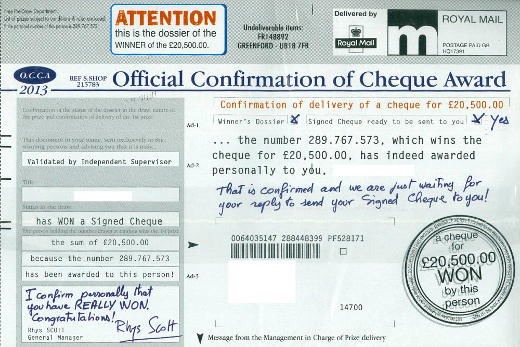A man from Bedford has been convicted for facilitating scams. From what I read about the story on the Daily Mirror and Beeb websites it seems he was mainly involved in prize draw scams. Stuff like this:

If you're keeping an eye on this blog you'll recognise this scam; I published this same image only a couple of weeks ago. The image was sent to me by a postman who feels guilty for delivering such "cruel mail" (see Message from a postman).
I think few people will believe that the man who has been convicted had no idea
about the scams he was involved in and that he was horrified
when he found out. He knew it were scams but until Trading Standard raided his office
(Daily Mirror) he didn't care. Which, it seems to me, is not unlike Royal Mail's attitude towards the scam mail business.
To be sure, I'm not suggesting Royal Mail should be opening people's mail – a caricature used by the Parliamentary Under-Secretary of State for Business, Innovation and Skills in a recent debate about scam mail. I'm talking about scams like the one depicted above. Thousands of Royal Mail employees will have seen this scam letter, and each and every one of them will have recognised it as a scam. Yet, nobody within the company contacted Trading Standards to make them aware of the fraud. On the contrary, Royal Mail has a (soon to be sold) stake in Spring Global Scam Mail – a company that helps criminals hide behind fake UK postcodes. That's exactly, according to the Mirror article, what our scammer from Bedford did.
The postman who contacted me about the scam letter suggested that postmen who knowingly deliver scam mail breach the Fraud Act 2006. If you read Section 6 of the Act it seems this is the case indeed:
The defendant:
- had possession or control of;
- an article;
- for use in the course of or in connection with any fraud.
The wording draws on Section 25 of the Theft Act 1968. The proof required is that the Defendant had the article for the purpose or with the intention that it be used in the course of or in connection with an offence.
A general intention that he or another will commit fraud (meaning an offence under Sections 1-4 of the Act) will suffice. In R v Ellames 60 Cr App R. 7 (CA) the Court of Appeal said:
"In our view, to establish an offence under Section 25 (1) the prosecution must prove that the Defendant was in possession of the article, and intended the article to be used in the course of or in connection with some future burglary, theft or cheat. But it is not necessary to prove that he intended it to be used in the course of or in connection with any specific burglary, theft or cheat; it is enough to prove a general intention to use it for some burglary, theft or cheat; we think that this view is supported by the use of the word "any" in Section 25 (1). Nor, in our view, is it necessary to provide that the defendant intended to use it himself; it will be enough to prove that he had it with him with the intention that it should be used by someone else."
Translated from Legalese: if I produce a scam letter and pay you 33p to deliver it to someone you're committing a fraud, provided that it can be safely assumed that you were aware that the letter you delivered was fraudulent.
Personally, I reckon it would be hugely unfair to prosecute individual postmen. But there is potentially a case against their employer.